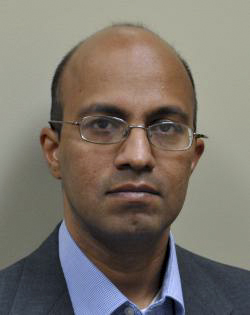Professor explores basil for cancer research
January 28, 2014
By mackenzie Mathews
WKU may be leading the charge against cancer with research for the first plant-based treatment targeting breast, colon and pancreatic cancers. The ultimate goal is to aid in curing all forms of cancer.
Chandrakanth Emani, a biology professor at WKU-Owensboro, spent the last semester beginning the initial steps of research that could change the face of cancer treatment with a seemingly simple solution: basil. However, Emani was quick to explain that the herb has many not-so-simple uses.
“Basil is a very great herb that has been used in the East for so many health aspects, like curing anything from the common cold to diabetes to cholesterol,” he said. “And when I looked at the literature, I saw that basil, in fact, contains a useful compound called eugenol. And eugenol has a potent effect for curing breast cancer.”
Emani said that basil leaves also create an anti-inflammatory reaction on colon and pancreatic cancer tumors.
According to preliminary studies, eugenol can be extracted from basil leaves and, when put on human tissue containing breast cancer cells, it halts tumor development. Emani said this is caused by chemical compounds within plants called metabolites, which carry the genes that create eugenol — the center of study.
“My first focus now with this research is I want to get the basil plant to make more of this eugenol, so it can be a storehouse of that compound, which can help us fight breast cancer. That, I would say, is the most important aspect of this research,” Emani said.
Testing the effects of the modified plants is expected to begin by the end of the year, placing WKU at the head of research for a plant-based cure. If all goes to plan, Emani believes that basil could revamp cancer treatment, making it more natural than present synthetic chemicals.
“What I’m looking for is a very environmentally friendly aspect. Maybe include the leaf in a diet to ward off cancer,” he said. “If the chance comes that they do have to make it into a pill, they would be using the plant extract itself, so it would be more environmentally friendly.”
The first phase of Emani’s work has been funded by the Office of Research.
Gordon Baylis, vice president for Research, said research programs such as this begin with internal funding, but the goal is to eventually be funded by the National Institute of Health. Baylis said he has high hopes for Emani.
“Quite frankly, Dr. Emani is a perfect example of exactly what WKU aspires to be: a university where students get exposure to cutting edge research, both in the classroom and the laboratory,” Baylis said.
Student interaction has gone as far as working in the lab. Emani has combined his coursework with research in order to give his students firsthand experience that will be useful no matter what their future career may be.
“Even if students aren’t going into research, even if they’re going into industry, the ability to take a problem and solve it — as you have to do in research — is an amazing skill that absolutely any company is interested in,” Baylis said.
The student involvement has all been made possible by FUSE (Faculty-Undergraduate Student Engagement) grants, which allow undergraduates hands-on involvement in their field.
Emani said students write a grant, build a budget and put together the proposal. If all goes through, they are allowed to begin their independent research. In this case, that would be inserting the eugenol gene into the basil plants.
Emani expressed his enthusiasm for this impactful opportunity available to his students.
“Some of them will be learning the techniques, and some of them will be writing a FUSE grant for an independent research project,” he said. “But at the end of the day, when they all come together they know that they have been working on a plant system for a useful compound which will come down the road.”
Emani is prepared for an extensive road ahead.
“If I see promising results, then I can suggest that now this plant is an environmentally friendly way to treat breast cancer. No more painful chemotherapy, but that’s still a long way to go.”






















![Students cheer for Senator at Large Jaden Marshall after being announced as the Intercultural Student Engagement Center Senator for the 24th Senate on Wednesday, April 17 in the Senate Chamber in DSU. Ive done everything in my power, Ive said it 100 times, to be for the students, Marshall said. So, not only to win, but to hear that reaction for me by the other students is just something that shows people actually care about me [and] really support me.](https://wkuherald.com/wp-content/uploads/2024/04/jadenmarshall-600x422.jpg)

